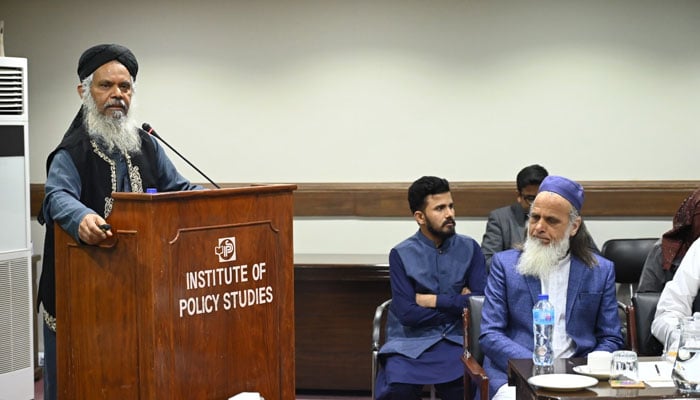‘Islam-centric approach crucial to cope with modern challenges’
Islamabad: Addressing modern challenges demands a transformative shift towards the system of knowledge production centred on Islamic epistemological foundations. This reorientation requires collective efforts from educators, policymakers, and communities to foster an Islamic knowledge paradigm, prioritising the practical application of Quranic teachings.
This was observed by Prof. Dr. Asad Zaman, former vice chancellor Pakistan Institute of Development Economics (PIDE), Islamabad, during a lecture on ‘Decolonisation of Education: An Islamic Perspective,’ held at the Institute of Policy Studies (IPS). Chairman IPS Khalid Rahman and a number of scholars and experts attended the session.
In a world where Western knowledge is often heralded as the sole path to progress, Muslim societies are facing a deep and difficult dilemma. Despite the Qur’an’s revolutionary message and the rich intellectual tradition of Islam, many Muslims find themselves unable to harness this knowledge to address modern challenges. This struggle is largely due to the historical colonisation of knowledge over the past two centuries.
Citing a prevailing belief that solutions to contemporary issues can only be found in Western ideologies and models such as democracy, secularism, and the rule of law, Dr. Asad said this mindset reflects a form of “compound ignorance”. Muslims have access to the knowledge of the Quran, but with this mindset, they struggle to apply it effectively to navigate present-day complexities. This continues to shape contemporary perceptions, leading many to overlook the transformative power of Quranic wisdom.
History has witnessed that the Qur’an’s application developed a civilization that enlightened the world for centuries. Its impact was profound, influencing fields from science to governance. The re-conquest of Spain (Al-Andalus) brought Islamic knowledge to Europe, sparking the end of the Dark Ages and paving the way for the enlightenment.
However, the essence of Islamic knowledge could not be absorbed by Europeans because it contradicted Catholic teachings. Consequently, the actual knowledge of Islam remains a treasure beyond their reach, he emphasised.
-
 Meghan Markle 'terrified' Over Possible UK Return
Meghan Markle 'terrified' Over Possible UK Return -
 Did Opiate Restrictions Lead To Blake Garrett's Death?
Did Opiate Restrictions Lead To Blake Garrett's Death? -
 Royal Expert Reflects On Princess Eugenie, Beatrice 'priorities' Amid Strained Relationship With Sarah, Andrew
Royal Expert Reflects On Princess Eugenie, Beatrice 'priorities' Amid Strained Relationship With Sarah, Andrew -
 Prince William's 'concerning' Statement About Andrew Is Not Enough?
Prince William's 'concerning' Statement About Andrew Is Not Enough? -
 50 Cent Gets Called Out Over Using Slur For Cardi B
50 Cent Gets Called Out Over Using Slur For Cardi B -
 Scientists Discover Rare Form Of 'magnets' That Might Surprise You
Scientists Discover Rare Form Of 'magnets' That Might Surprise You -
 Nancy Guthrie’s Kidnapper Will Be Caught Soon: Here’s Why
Nancy Guthrie’s Kidnapper Will Be Caught Soon: Here’s Why -
 AI Innovation Could Make Trade Secrets More Valuable Than Patents, Says Billionaire Investor
AI Innovation Could Make Trade Secrets More Valuable Than Patents, Says Billionaire Investor -
 King Charles Heckling: Calls For 10 BAFTAs And A Knighthood For Sign Language Interpreter
King Charles Heckling: Calls For 10 BAFTAs And A Knighthood For Sign Language Interpreter -
 Kim Kardashian Leaves Meghan Markle 'upset' With Latest 'cheap Shot'
Kim Kardashian Leaves Meghan Markle 'upset' With Latest 'cheap Shot' -
 Royal Expert On Andrew, Sarah Ferguson’s ‘entitled’ Behaviour Since Marriage
Royal Expert On Andrew, Sarah Ferguson’s ‘entitled’ Behaviour Since Marriage -
 Instagram And YouTube Accused Of Engineering Addiction In Children’s Brains
Instagram And YouTube Accused Of Engineering Addiction In Children’s Brains -
 Trump Reached Out To Police Chief Investigating Epstein In 2006, Records Show
Trump Reached Out To Police Chief Investigating Epstein In 2006, Records Show -
 Keke Palmer Praises Actor Who Inspired 'The Burbs' Role
Keke Palmer Praises Actor Who Inspired 'The Burbs' Role -
 Humans May Have 33 Senses, Not 5: New Study Challenges Long-held Science
Humans May Have 33 Senses, Not 5: New Study Challenges Long-held Science -
 Kim Kardashian Prepared To Have Child With Lewis Hamilton: 'Baby Using A Surrogate'
Kim Kardashian Prepared To Have Child With Lewis Hamilton: 'Baby Using A Surrogate'




